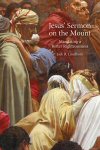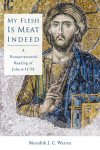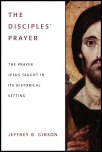Fortress Studies on Passages in the Gospels (3 vols.)
Digital Logos Edition
Overview
The Fortress Studies on Passages in the Gospels collection brings together three compelling looks at key moments in the Gospels. Each study is rooted in sound exegesis, covering the Lord’s Prayer, the Sermon on the Mount, and the Last Supper. Though the topics are familiar, the approach each scholar takes is new. These volumes help you delve into well-known terrain and come away with bold new insights.
In the Logos editions, these volumes are enhanced by amazing functionality. Important terms link to dictionaries, encyclopedias, and a wealth of other resources in your digital library. Perform powerful searches to find exactly what you’re looking for. Take the discussion with you using tablet and mobile apps. With Logos Bible Software, the most efficient and comprehensive research tools are in one place, so you get the most out of your study.
Get the Fortress Studies on Jesus and the Gospels (7 vols.) for more new insight into Jesus’ teaching.

Key Features
- Includes focused studies on pivotal Gospel passages
- Offers fresh perspectives backed by sound research
- Features valuable insight into Jesus’ key teachings
Product Details
- Title: Fortress Studies on Passages in the Gospels
- Publisher: Fortress Press
- Publication Date: 2015
- Volumes: 3
- Pages: 837
- Resource Type: Monographs
- Topic: Gospels
Individual Titles
- Jesus’ Sermon on the Mount: Mandating a Better Righteousness by Jack R. Lundbom
- My Flesh Is Meat Indeed: A Nonsacramental Reading of John 6:51-58 by Meredith J. C. Warren
- The Disciples’ Prayer: The Prayer Jesus Taught in Its Historical Setting by Jeffrey B. Gibson

The Sermon on the Mount is the best-known and most frequently studied repository of Jesus’ teachings. Amid the considerable erudition expended on the Sermon, however, Jack R. Lundbom argues that scholars have deflected or disregarded the main thrust of the sermon, which he characterizes as a mandate to holy living and a “greater righteousness.”
Through careful attention to the structure of Matthew’s Gospel and the place of the Sermon on the Mount within it and judicious comparisons with Jewish and rabbinic literature, Lundbom elucidates Jesus’ message and its continuity with Israel’s prophetic heritage and Jewish teaching. Appealing to Christian commentators, Lundbom brings its most important themes to life for the contemporary reader, seeking always to understand what the “greater righteousness” to which Jesus summons us might mean for today.
The book is an excellent resource for the preacher, teacher, and any student of the Bible who is looking for solid scholarship and insightful application for service to the church and for personal reflection.
—Arland J. Hultgren, professor emeritus of New Testament, Luther Seminary
Jack R. Lundbom is a professor at the University of Cambridge. He is the author of the three-volume Anchor Yale Bible commentary on Jeremiah 1–20, Jeremiah 21–36, and Jeremiah 37–52, as well as Deuteronomy: A Commentary and The Hebrew Prophets: An Introduction.

Readers have long puzzled over why Jesus’ words over the bread and wine are absent from the Johannine Last Supper. This suggests to some that John is indifferent—even hostile—to sacramental thought or action. These scholars also point to the apparent relocation Jesus’ declaration that believers must eat his flesh to the feeding miracle in John 6. Meredith J.C. Warren argues that in fact, the “bread of life” discourse in John 6:51c-58 does not bear any Eucharistic overtones. Rather, John plays on shared cultural expectations in the ancient Mediterranean world about the nature of heroic sacrifice and the accompanying sacrificial meal, which established the identification of a hero with a deity.
From Homer and continuing through Greek romances like Chaereas and Callirhoe, An Ephesian Tale, Leucippe and Clitophon, and An Ethiopian Story, Warren traces a literary trope in which a hero or heroine’s antagonistic relationship with a deity is resolved through the sacrifice of the hero. She argues that seen against this milieu, Jesus’ insistence that his flesh be eaten serves to demonstrate his identity and confirms the Christology of the rest of the Gospel.
With insight and judgment, Meredith Warren solves a major problem in the Gospel of John—why does John 6:51c-58 appear to refer to Eucharist if there is no Eucharist per se in the last meal in John?—and opens up important new resonances in the process. The relationship of the Gospel of John to Jewish, Greek, and Roman tradition is greatly illuminated in this groundbreaking volume.
—Lawrence M. Wills, professor of biblical studies, Episcopal Divinity School
Meredith J. C. Warren is an FRQSC postdoctoral fellow at the University of Ottawa. She completed her doctorate in New Testament and early Judaism at McGill University in Montreal, under the direction of Ellen Aitken.

Christians around the world recite the Lord’s Prayer daily, but what exactly are they praying for, and what relationship does it have with Jesus’ own context? Jeffrey B. Gibson reviews scholarship that derives the Lord’s Prayer from Jewish synagogal prayers and refutes it. The genre of the prayer, he shows, is petitionary, and understanding its intent requires understanding Jesus’ purpose in calling disciples as witnesses against “this generation.” Gibson concludes that Jesus did not mean to teach a unique understanding of God; the prayer had its roots in first-century Jewish movements of protest.
Gibson shows that the prayer, in context, has little to do with “calling down” into the present realities of “the age to come.” Rather, it was meant to protect disciples from the temptations of their age and, thus, to strengthen their countercultural testimony. Gibson’s conclusions offer new insights into the historical Jesus and the movement he sought to establish.
[Gibson’s] analysis of what is most likely the original setting of this prayer is both exhaustive and impressive. Gibson’s interpretation of ‘The Disciples’ Prayer’ as a part of Jesus’ efforts to instruct the disciples in maintaining faithfulness to God deserves a wide readership.
—David Crump, professor of religion, Calvin College
Jeffrey B. Gibson is adjunct instructor of humanities and religious studies at Harry S. Truman College in Chicago, Illinois. A graduate of the University of Oxford, he is the author of The Temptations of Jesus in Early Christianity.
This title is included in the following collections
You can save when you purchase this product as part of a collection.
2025 Lutheran Portfolio
$4,749.99$3,562.492025 Ultimate Library
$23,999.99$17,999.99
Reviews
0 ratings

Larry Craig
10/2/2024
These books would get more use if they were tagged as commentaries. I know I would get them, but monographs don't get much use unless somebody cites them somewhere